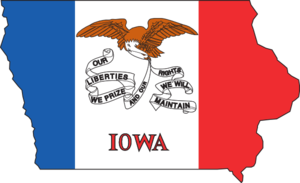November 25, 2013 •
Iowa Ethics Board Publishes New Advisory Opinion
The ethics board in Iowa issued an advisory opinion allowing political candidates in the state to use campaign funds to attend a presidential inauguration. The board’s reasoning for its decision centered around the value to a candidate’s campaign of attending […]
 The ethics board in Iowa issued an advisory opinion allowing political candidates in the state to use campaign funds to attend a presidential inauguration.
The ethics board in Iowa issued an advisory opinion allowing political candidates in the state to use campaign funds to attend a presidential inauguration.
The board’s reasoning for its decision centered around the value to a candidate’s campaign of attending an inauguration event.
Under the opinion, a campaign committee can pay for the candidate’s travel and lodging, but cannot pay such expenses for anyone else.
January 14, 2013 •
Monday News Roundup
Let’s start off the week with these lobbying, campaign finance, and ethics news articles:
 Lobbying
Lobbying
“Newly unemployed lawmakers buzzing about million-dollar lobbying jobs” by Kevin Bogardus in The Hill.
California: “Interactive graphic: Hidden lobbying expenses” by Sharon Okada in the Sacramento Bee.
California: “California’s lobby laws keep many influence-peddling details secret” by Laurel Rosenhall in the Sacramento Bee.
Nevada: “Lobbyists sit through ethics training in Carson City” by David McGrath in the Las Vegas Sun.
“Two Buerkle staffers land jobs with Washington, D.C., lobbying firms” by Mark Weiner in the Post-Standard.
Campaign Finance
“Money in Politics This Week” by Syed Zaidi in the Brennan Center for Justice Blog.
“FEC Appointments Are Deciding the Future of Campaign Finance” by Alex Gauthier in the Independent Voter Network.
Mississippi: “Judge sets trial date for campaign finance case” by The Associated Press in the Mississippi Business Journal.
Wisconsin: “Mike McCabe featured speaker, topic is Campaign Finance Jan. 26 public meeting” in the Bay View Compass.
Ethics
“Harry Reid Disavows Report Linking Him to Bribery Case” by Neils Lesniewski in Roll Call.
Texas: “Some State Legislators Blur Line Between Public and Private Interests” by Emily Ramshaw in The New York Times.
State Legislatures
“More than Half of State Legislatures Convened this Week” by Angela Andrews in NCSL’s The Thicket blog.
Washington: “Key players to watch in the Washington Legislature, which convenes Monday” in the Seattle Times.
The Presidential Inauguration
“Critics Decry Looser Rules For Inauguration Fundraising” by NPR in Oregon Public Broadcasting.
“Fund-Raising Is Lagging, So Far, for Inaugural Plans” by Nicholas Confessore in The New York Times.
“An inauguration first: Apps” by Steve Freiss in Politico.
April 29, 2011 •
Highlighted Site of the Week – Federal Hall
On April 30, the 222nd anniversary of the inauguration of George Washington at Federal Hall is remembered. The building was also the where the Bill of Rights was written!
As part if its Weekly Historical Highlights, the website of the U.S. House of Representatives Office of the Clerk remembers the very first presidential inauguration at Federal Hall in New York City. On April 30, 1789, the inauguration ceremony for George Washington was held in Federal Hall, where Federal Congress first met before moving to Philadelphia. The Office of the Clerk site gives an account of the event and says Washington was very humbled by the occasion.
The original building was located on Wall Street. It was built in 1700 and originally served as the New York City Hall. From 1785-1789, it served as the capitol where Congress met. According to the U.S. Senate website: “When Congress convened for the first time on March 4, 1789, the old building had been converted into a splendid capitol, optimistically renamed Federal Hall.”

The National Park Service (NPS.gov) gives us a great picture of the landmark events that Federal Hall has witnessed: “After the American Revolution, the Continental Congress met at City Hall and, in 1787, adopted the Northwest Ordinance, establishing procedures for creating new states.When the Constitution was ratified in 1788, New York remained the national capital. Pierre L’Enfant [who designed the city plan for the District of Columbia] was commissioned to remodel the City Hall for the new federal government. The First Congress met in the now Federal Hall and wrote the Bill of Rights.”

The NPS goes on to say that when the nation’s capital was moved to Philadelphia, the building went back to being New York’s city hall. In 1812 the building was torn down and a new one was opened in 1842, functioning first as the Customs House, then as a Treasury, and finally as a national memorial to Federal Hall.
If you are in New York City, there is tour information for Federal Hall here and here. You might wish to follow the New Amsterdam trail that starts at Castle Clinton and ends with Federal Hall.
Have a great weekend!
State and Federal Communications, Inc. provides research and consulting services for government relations professionals on lobbying laws, procurement lobbying laws, political contribution laws in the United States and Canada. Learn more by visiting stateandfed.com.


